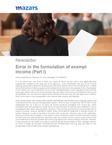
Error in the formulation of exempt income (Part I)
It is no secret that Law 1819 of 2016, by means of which the tax reform was approved, was substantially modified in the days prior to its approval. Such modification was due to the intense lobbying exercised by different interest groups and which led the Government to desist from multiple levies that had been initially proposed and to adopt others that were not proposed in the initial project. In the midst of so much intervention by so many interested parties, many regulations were left with large gaps, others with errors and inconsistencies and others with serious contradictions that, as will be explained, can not only have highly harmful effects on the economy, but also wipe out an industry. Such is the case of river transportation with shallow-draft vessels and flatboats.
River transportation with shallow draft vessels and flatboats was identified as a strategic activity that could dynamize the country's transportation system, which is why, through Law 788 of 2002, it was established that, for a term of 15 years, its income would be exempted from income tax. Other exempted rents were granted for longer terms, as was the case of hotel services rendered in new or remodeled hotels, which was granted for 30 years. Time went by and the Government, faced with the need to increase revenue, decided to wither and/or terminate the treatment of exempt income for certain industries in order to be able to tax them with income tax. However, due to the -legitimate- pressure of those who invested in such sectors, it was necessary to grant a kind of transition regime so that those who had started their activities under the exempt income regime could continue with such treatment for the term granted and not be surprised by the untimely change of the law. Likewise, it was essential for the State to be able to continue giving fiscal privilege to other strategic sectors, on which it based its long-term development bet. Paradoxically, this was also the case of river transportation with shallow-draft vessels and flatboats.
Thus, as the Government wanted to extend the benefits for the river transport industry for fifteen more years and given the eagerness and lack of rigor with which the tax reform was finalized, such incentive was granted and, simultaneously, eliminated from the text of the tax reform. Thus, while numeral 8 of article 99 of the reform established that, as from January 1, 2018, the income from such transportation would be exempt from income tax for 15 years, article 98 of the same law established that "as from the taxable year 2018, inclusive, the exempt income provided for in numeral 2 (...) of this article shall be subject to income tax". Number 2 referred to above corresponds to the exempted income for shallow draft river transportation. In other words, the exemption is conferred and simultaneously eliminated, and this will surely be used by the Dian to indicate that, as from 2018 such exemption will not be applicable.
Not even with the greatest hermeneutical effort is it possible to interpret that this contradiction is innocuous and that it does not constitute a final blow to the development of river transportation in Colombia. We will see the Government trying to "clarify" this through "regulatory" decrees or, probably, through the already well-known decrees by which "minor" spelling mistakes are corrected.


